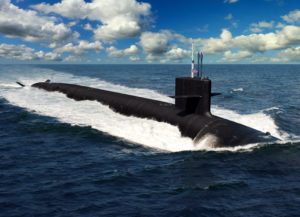The White House’s request to Congress for exemptions to be included in a likely stopgap spending measure covers procurement of two Columbia-class submarines, development of the W93 submarine-launched nuclear warhead and funds for Space Force, according to documents.
The list of “anomalies” for a continuing resolution arrives as the administration and congressional leadership have agreed on a tentative deal to avoid a government shutdown, as FY ’21 appropriations packages are unlikely to be approved before the end of the month.

While a CR would halt new programs from starting and locks in spending at FY ‘20 levels, the list of proposed anomalies would provide an exemption for select requests.
The request calls for allowing the Navy to procure the first two Columbia-class submarines, as well as granting authorities to fund the new subs incrementally.
“Without the anomaly, DOD would be unable to begin design and construction activities for these ships and the Navy would be unable to meet U.S. Strategic Command requirements,” the White House wrote in its request.
The Navy’s top acquisition official told reporters recently that an anomaly in the CR for the submarines would be required to keep the program on schedule (Defense Daily, Sept. 4).
In June, the Navy awarded General Dynamics Electric Boat [GD] an $869 million modification for continued Columbia-class ballistic missile submarine (SSBN) procurement work with an added price option for the first two submarines that would increase the total contract value to $9.5 billion (Defense Daily, June 22).
For the W93 submarine-launched nuclear warhead, the White House is requesting the anomaly to start development, adding that a CR may lead to “risking misalignment with the schedules of the U.S. Navy and the United Kingdom.”
The White House is also calling for the CR to transfer several accounts from the Air Force’s budget to the new Space Force, to include $2.6 billion for operations and maintenance, $10.3 billion for research, development test and evaluation, $2.2 billion for procurement and $77 million for Overseas Contingency Operations funds.
“Without this anomaly, most Space Force activities during the period of the CR would be required to be funded from the Air Force accounts, requiring manual adjustments of the obligations and disbursements if the final FY 2021 appropriations bill provides funding for these activities in the Space Force accounts,” the White House wrote in their request. “This administrative burden would adversely impact Space Force’s mission execution as staff would devote more time to duplicative administrative work.” A House Armed Services Committee aide also confirmed that a final conference report for the FY ‘21 defense authorization bill may not be finalized until after the Nov. 3 election, while noting committee staffs have begun to work through differences in the House and Senate versions of the bill.
President Trump has threatened to veto the final version of the NDAA over provisions to rename military installations named after Confederate leaders.